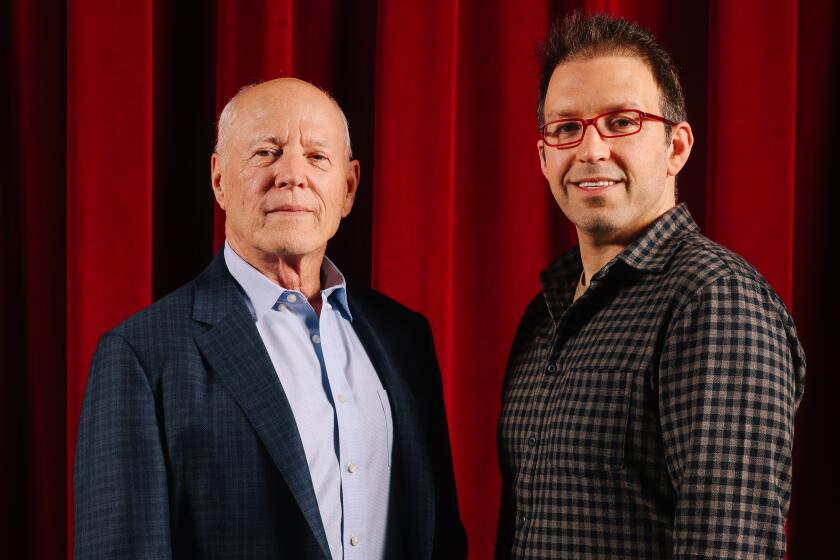A THEATERPHILE ANSWERS A THEATERPHOBE
‘I’m a movie critic--how can I hate the theater? It’s almost unnatural. But every time I go, proud of my attention to duty, I feel awful. Something is wrong.”
So writes David Denby in the January Atlantic Monthly. His article, “Stranger in a Strange Land: A Moviegoer at the Theater,” will make theater people groan, but they should read it anyway. It will show them where some of their customers are coming from these days--or, rather, not coming from.
Denby, a film critic for New York magazine, has no trouble seeing four or five movies a week. He also attends concerts, dance events, the opera. But he has to drag himself to the legitimate theater. And he doesn’t believe most of what he sees there--literally does not believe it. It’s not a question of the quality of the play. There is something about the theater process that turns him off.
What, though? Last year, Denby submitted himself to a flock of New York shows in order to find out. A few of them he liked: “Heartbreak House,” “Noises Off,” “My One and Only” and, especially, David Mamet’s “Glengarry Glen Ross,” which passed his toughest test. It had “the hard, cool, non-symbolic quality of a great American film.”
The rest of the shows left him homesick for the movies--that “dreamlike experience in the dark.” His article spells out his complaints against the embarrassingly out-front art of the theater, some of them fairly loopy. Clearly, we are dealing with a real aversion here, not just an aesthetic preference. And Denby isn’t the only member of the film-TV generation to suffer from it.
To clear away some of the brush first: Denby’s complaints against “the theater” sometimes turn out to be merely his disagreements with certain shows.
For example, he finds Jessica Tandy too strong as the mother in “The Glass Menagerie.” He wants a more fragile, distracted Amanda--someone like Laurette Taylor. That’s a fair criticism, but it has nothing to do with the stage-vs.-screen question. Would Denby like Tandy’s approach any better if this were a movie?
When he does generalize, he goes too wide. It’s fair to criticize Bruce Davison for listening to his own voice as Tom in “Menagerie.” That doesn’t prove that the sound of the projected stage voice is in itself phony, as opposed to voices in the movies, where people sound like people.
In fact, the raised voice of the theater actor is no more unnatural a device than the enlarged face of the movie actor. Like the close-up, it’s a way of giving the audience access to what the character is feeling--the size of it. To condemn the projected voice because some stage actors project self-consciously is like condemning the close-up because some film actors mug.
Again, Denby is within his rights to reject the sudsy optimism and “phony Broadway energy” of the musical “Baby.” This falls short of proving that it’s the nature of theater to push middle-class affirmations at us, while movies share with us the cozy open secret that it’s a crappy world. Where does that leave Samuel Beckett and Frank Capra?
I’m not talking old movies, Denby might reply, I’m talking now. Similarly, he gives British actors like Rex Harrison the right to project all over the place (although British playwrights like Tom Stoppard strike him as too clever by half). So far, his argument has too many loopholes and not-provens to be taken as a generic indictment of the stage.
It does, however, amount to a lively gripe-list against the Broadway theater. And here we notice something surprisingly personal in Denby’s tone. It’s interesting that he begins his article with a memory of having been taken to Broadway shows by his parents as a kid. Because a trip back to Shubert Alley seems to return him to the condition of a child--a precocious 15-year-old determined not to be impressed.
Watching some actual 15-year-olds cheering Dustin Hoffman in “Death of a Salesman,” for example, Denby is positive that their teachers must have put them up to it. How could any kid of today respond to such an old-fashioned, platitudinous piece? Denby also can’t stand the awful ordeal of squeezing past people in order to get to one’s seat in a Broadway house. Old people, with minks and camel’s-hair coats folded on their laps. Who talk about their diseases until the curtain goes up. Yech!
Somehow this doesn’t sound like a 41-year-old film critic who knows what Brahms thought about “Carmen.” It sounds like Holden Caulfield deciding that all those people talking about the Lunts out in the lobby are phonies. What is there about the theater, you wonder, that can make a grown man feel as surly as an adolescent?
Here, I think, we do get to a central difference between the theater and the movies. At the movies, you don’t have to do anything. In the theater, you have to help. And something in Denby resents it.
Almost every objection that he has to the stage experience relates to this. As a film person, he yearns to be alone in the Platonic cave of the movie house, caught up in a stream of ever-changing images that are both bigger than life and true to life. He doesn’t want to squint to see, or strain to hear. Above all, he doesn’t want to have to pretend.
“Think, when we speak of horses, that you see them.” That’s not for Denby. He wants to see real horses--that is, pictures of them. He wants to see real waves and real smokestacks, and not be asked to see them as symbols. He wants to see real people, too, behaving pretty much as real people do--no fancy language or strange posturings.
Next to this, theater offers too little to the eye and asks too much of the imagination. Denby: “We (theaterphobes) cannot suspend disbelief; everything that happens in the theater reminds us that the only thing real in that place is the actors, standing on the stage. How can anything be represented on a stage? The place for representation is the cinema. . . . “
A theaterphile would answer: “Ah, but that’s the point. The stage is the place for representation, the place where one thing stands for something else. The cinema is the place for duplication. It fills the eye. The stage fills the mind’s eye--if the show is good enough.”
Example: One of the shows that Denby passed up last winter, because he figured he wouldn’t like it, is “Cats.” I have yet to see a still picture or film clip of this show that didn’t make it look silly. But in the theater, if the dancers are right (I can’t yet speak for the Los Angeles company), we do see . . . or feel . . . the mystery of a rag-tag coven of cats celebrating in a midnight garbage dump.
Similarly, the silver masks worn by the chorus in “Equus” (stage version) evoked the otherness of horses much more effectively than did any image in the film version, without insisting that the horses were “really” there. It’s the double image that we theaterphiles like--the signifier and the thing signified.
Thus, for us, it’s not a problem that Dustin Hoffman in “Death of a Salesman” gives us, as Denby puts it, “not an old man trying to act young, but a metaphor for an old man trying to act young.” For us, it’s not a problem that the clock on the wall in “ ‘Night, Mother” is another kind of metaphor. We like it that the stage plays the game of as-if in such an open fashion.
But one has to join in the game. Until reading Denby’s piece, I hadn’t realized what a problem this is for at least some people who have grown up with television. “We suffer,” writes Denby on behalf of his fellow theaterphobes, “from a kind of physical embarrassment at the spectacle of actors pretending they are not being watched.”
I wonder. Isn’t the embarrassment rather that the stage actor in some fashion acknowledges that he is being watched, and summons the viewer to come along on the journey? Meaning that the viewer can’t just sit back in the dark without feeling guilty?
“Give me your hands, if we be friends.” That line also has a special magic for theaterphiles. It signifies the moment when the tale has been told and both the actors and the audience can acknowledge their collaboration. In contrast, when the lights go up after a movie, there’s nothing there but a blank wall. The dream is over.
Plenty of nonsense has been written about the theater, and Denby is right to be skeptical about phrases like “the electricity of the living actor.” (Which actor? Olivier on film carries more excitement than Sam Glutz on stage.) Denby is also right when he says that a bad play is a deadlier experience than a bad movie. (The movie at least gives you some interesting pictures along the way.)
He’s right to find language--as in “Heartbreak House” and “Glengarry Glen Ross”--the glory of the theater. (Which is why stage language has to be special, both in the writing and the playing.) And when he praises a musical as entranced with theater style as life as “My One and Only,” one suspects that his theaterphobia is milder than it looks. One wishes him a total recovery, for he’s missing a lot of pleasure.
More to Read
The biggest entertainment stories
Get our big stories about Hollywood, film, television, music, arts, culture and more right in your inbox as soon as they publish.
You may occasionally receive promotional content from the Los Angeles Times.





